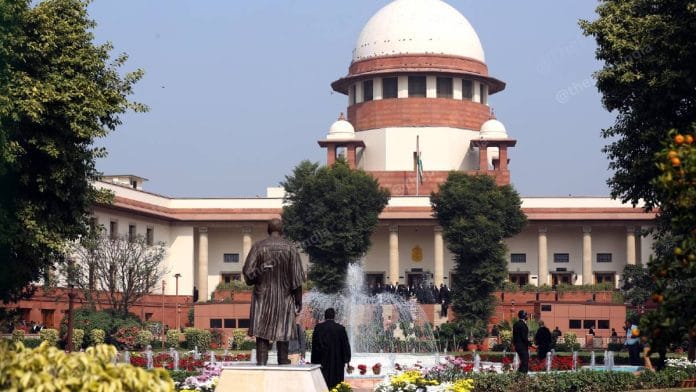New Delhi: The Kerala government has moved the Supreme Court challenging the very legitimacy of a presidential reference pending before it, pertaining to powers of the President and the governors to clear state bills.
The state has criticised the reference, put forth by President Droupadi Murmu on 13 May, as not in line with the Constitution, factually “misleading”, and an “improper” use of presidential power to reopen matters already settled by the apex court.
In its application filed Sunday, seen by ThePrint, Kerala has urged the top court to declare the presidential reference as non-maintainable and to return it unanswered, citing “suppression” of facts and serious legal flaws.
The crux of its argument is that the presidential reference misrepresents Article 200 of the Constitution by claiming that no timeframe exists for a Governor to act on a bill. The plea asserts that this interpretation suppresses the fact that multiple binding judgments of the apex court have already laid down a clear timeline for gubernatorial assent.
The state specifically cites the Supreme Court’s ruling in State of Tamil Nadu vs Governor of Tamil Nadu, delivered on 8 April—just a month before the presidential reference was made to the court. The SC had then set timelines for the President and the Governor to decide on bills and also held that the Governor’s inaction was subject to judicial review.
Kerala contends that the presidential reference suppresses the existence of this judgment and other relevant precedents, that its “basic foundation is tainted”, and the majority of the questions are directed to the Supreme Court to “overrule its judgments”.
The presidential reference made in May had 14 questions raising constitutional concerns about the court’s interpretation of Articles 200 and 201. It has been sought under Article 143(1) of the Constitution, which entails the President’s power to consult the top court in certain situations.
Article 200 deals with assent to bills passed by state legislatures, and entails the Governor’s powers regarding these bills, including whether to grant or withhold assent, or reserve the bill for the President’s consideration. Article 201 relates to similar powers that can be exercised by the President.
The Kerala government argues that because of the SC’s 8 April judgment, one of the queries raised in the presidential reference is “no longer res integra”, meaning no longer untouched by precedent.
The state contends that the reference implicitly asks the Supreme Court to overrule its own findings in crucial judgments, particularly the Tamil Nadu case, “a power which is not available to the Supreme Court”.
State’s stand
On 13 May, the President made a special reference to the SC under Article 143, seeking its advisory opinion on key questions concerning the powers of Governors and the President.
According to the Kerala government, the reference constitutes a “serious misuse” of power under Article 143.
The Article empowers the President to seek the Supreme Court’s advisory opinion on questions of law or public importance. Kerala’s application relies on landmark rulings to argue that this power cannot be used to overturn or revisit settled decisions of the court.
In the Cauvery Water Disputes Tribunal case (1993), the Supreme Court held that it could not, under Article 143, sit in appeal over its own decisions. The President, it ruled, cannot confer appellate jurisdiction on the Supreme Court through a reference.
Overruling prior judgments, the court held, is a power to be exercised only in exceptional cases, such as when a decision is “per incuriam”—patently wrong and causing public mischief—not through Article 143.
Similarly, in the Natural Resources Allocation case (2012), the Supreme Court observed that it may decline to answer a presidential reference if the questions raised are already settled by existing judgments, or if they involve issues of a purely political or socio-economic nature, lacking constitutional significance.
Kerala argues that the current presidential reference meets both these criteria for rejection.
Its application also alleges that the central government is making an “oblique” challenge to the binding judgment in the Tamil Nadu Governor case. It points out that no review or curative petition has been filed against the April ruling, implying that the judgment has attained finality and is binding under Article 141 of the Constitution.
The state says the presidential reference implicitly seeks to overturn this binding precedent without following due legal process.
Kerala contends that the presidential reference “loses its legitimacy” by misinterpreting Article 200 and misstating that no timeline was fixed for a Governor’s action on bills. By suppressing the binding judgment of 8 April and other precedents, the reference seeks to mislead the court into reversing its own decision—without even disclosing that such a reversal is being requested, it argues.
The Supreme Court, meanwhile, has agreed to examine the presidential reference and has sought responses from the Centre and states by 29 July.
Ruchi Bhattar is an alum of ThePrint School of Journalism
(Edited by Nida Fatima Siddiqui)
Also Read: ‘Cooling period’ & scrutiny by district panel. SC upholds 2022 safeguards against misuse of 498A IPC






